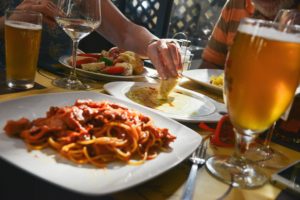I’m sure you’ve noticed the “GLUTEN FREE” advertising popping up more and more as you go through your shopping trips. There’s been a huge market for gluten free foods in recent years as a higher percentage of people are starting to eat this way. What I want to do is explain what gluten is, where you can find it, and talk about some of the benefits and drawbacks of this type of diet.
So let’s get right into it! What exactly is “gluten“? It’s the name of a protein that can be found in foods, cosmetics, medications, and supplements. It tends to act like a glue and it holds other ingredients together to help items take on a specific texture or shape.
Now comes the really tricky part! Where would you find gluten?
The answer to this is a list longer than any blog post should be… so I’m going to modify things a little to give an idea what you’re looking for. You may have recalled that I’ve mentioned sometimes carbohydrates get a bad rap? Gluten doesn’t help their reputation! The foods that stand out and are absolutely a must-avoid on a gluten free diet include: wheat, rye, and barely. GRAINS! Some of the foods you need to avoid are:
to modify things a little to give an idea what you’re looking for. You may have recalled that I’ve mentioned sometimes carbohydrates get a bad rap? Gluten doesn’t help their reputation! The foods that stand out and are absolutely a must-avoid on a gluten free diet include: wheat, rye, and barely. GRAINS! Some of the foods you need to avoid are:
- pasta
- breads (including pancakes, biscuits, muffins…etc.)
- baked goods/pies/cakes
- crackers
- cream of wheat
- most cold cereals
- most foods with flour such as sauces, gravy, salad dressings
- oatmeal – oats don’t actually have gluten, but unless your oatmeal specifically says “gluten free”, it’s probably made in the same plant as foods with gluten, so cross-contamination is likely.
- beer
- most soups
There are ingredients made from wheat, rye, or barley that aren’t going to directly jump out as having gluten… but they do! Some of those hidden ingredients to scan labels for are items such as:
- modified food starch
- lecithin
- semolina
- triticale
- MSG/soy sauce
- malt
That’s a lot of restrictions…. but if you have to follow them, it’s for a good reason! There are conditions where combing through the labels is more than worth it! Have you ever heard of Celiac Disease or Celia Sprue? Those are 2 different names that mean someone has an allergy to gluten. It’s rare, so you may not have heard those terms. Celiac Disease affects just under 1% of the population. Some people may also have a wheat allergy, or they may be gluten sensitive, which is a little more common to hear. Being gluten sensitive means that when a person eats foods with gluten, they have symptoms like bloating, stomach pains, or sudden changes to bowel habits… but they test negative for an allergy. That’s a very important difference to keep in mind! Sensitivities to food range from mildly to extremely uncomfortable and can seriously effect quality of life. When a person has an allergy, the immune system is attacking and that can create danger and be life threatening. When a person with Celiac Disease does not follow a gluten free diet, they are causing continued damage to their small intestine. Because of this damage, they’re susceptible to malabsorption, vitamin & mineral deficiencies, osteoporosis, anemia, & cancer. Another condition that causes some people to be gluten free is IBS (irritable bowel syndrome.) There is research that has shown some relief of symptoms for people with IBS when they reduce sources of gluten from their diet.
So if there’s such a small portion of the population who have these diseases, why do we hear about it all the time?
 For years now, there have been movies and media coverage that even people without Celiac Disease or gluten sensitivities should avoid foods that contain gluten. Some of the reasons that initially came out against gluten included information that gluten caused inflammation reactions, “leaky gut” syndrome, bloating and weight gain. There were also arguments made that humans hadn’t evolved to properly digest wheat because it is not a grain of our ancestors.
For years now, there have been movies and media coverage that even people without Celiac Disease or gluten sensitivities should avoid foods that contain gluten. Some of the reasons that initially came out against gluten included information that gluten caused inflammation reactions, “leaky gut” syndrome, bloating and weight gain. There were also arguments made that humans hadn’t evolved to properly digest wheat because it is not a grain of our ancestors.
Well that all sounds terrible! Of course you want to avoid that! But like any new research… results need to be consistently replicated to really be able to make a case one way or the other.
As a response to the negative information being discussed about gluten, there were arguments being made for the other side of the debate. One rebuttal concluded that the study showing inflammation occurred was not done in live test subjects, so could not be used to determine human reaction. Information was also put out there that there are other proteins and starches in wheat, rye, and barely; so gluten may be wrongly isolated. There was a professor in 2011 who published a study showing people without Celiac Disease had a negative response to gluten. He later found inconsistencies in his own research. He tightened up the method for a new study, and then produced results that had the opposite effect and ended up withdrawing his original statement.
The idea that turning to a gluten free diet can aid in weight loss efforts isn’t necessarily specific to the gluten protein. Take another look at the list I wrote for gluten-containing foods in the beginning of the blog! That’s pretty significant! And since a lot of those foods do make up a good portion of our western diet choices… just think about what’s happening when you eliminate them! Elimination of large amounts of foods can result in taking in less calories overall. So even if you’re not counting calories, it makes sense that getting rid of so much food would result in less calories.
On the opposite end of the weight spectrum… there are other people who reported GAINING weight on a gluten free diet! Wait a second… If I JUST said it makes sense that taking food away would result in less calories, how is that even possible?
Taking away foods would result in less calories… but what if some people took foods away and replaced them with higher calorie items? Supply and demand made this possible! There are entire sections of stores dedicated to gluten free items now to help those with restrictions to enjoy the same types of foods as everyone else. There are gluten free flours, pastas, breads, cake mixes, beers, etc. Removing the gluten protein from foods often results in the addition of higher amounts of fat, sugar, and salt to make up for taste & texture differences. So when you take away the foods you feel are unhealthy for you, just because there’s a similar item labeled “gluten free”, it doesn’t mean it’s necessarily more healthy just because the gluten is gone.
Another issue that’s been raised has to do with nutrient deficiencies. Wheat, rye, and barely are pretty significant sources of fiber & B vitamins! Fiber is my carbohydrate super hero… it’s definitely not something you want to skip out on!
As always, there’s no single study out there that has completely obliterated the idea that gluten is absolutely wonderful vs. something out of the next major horror movie hit!
 It’s the job of health professionals, scientists, and research teams, to produce the best information possible with their knowledge & expertise. What we as consumers tend to do with that information is where craziness can set in! When studies are published, we absolutely should check them out. We should also read them, carefully and objectively. Let’s add the information to what we already know and keep on learning more!
It’s the job of health professionals, scientists, and research teams, to produce the best information possible with their knowledge & expertise. What we as consumers tend to do with that information is where craziness can set in! When studies are published, we absolutely should check them out. We should also read them, carefully and objectively. Let’s add the information to what we already know and keep on learning more!
Some of the dietary recommendations I teach about grains come from the Dietary Guidelines for Americans 2015-2020. The recommendations are updated every 5 years taking into account not just one study, but a collection of information from years of current & past research. Based on a 2000 calorie diet, a person should aim for 6 servings of grains per day, with half of those grains coming from whole grains. That recommendation recognizes the benefits of different nutrients and that these foods provide adequate energy, iron, fiber, B vitamins, zinc, magnesium, copper & selenium. A diet with adequate whole grains is also linked to improved heart health, reduced risk of some cancers, reduced risk of digestive diseases such as diverticular disease, and an increase in beneficial gut bacteria.
I like to take information from the recommendations that are tried and true and have been producing consistent results for years. When new information comes out, I like to keep up to date, but I don’t necessarily overhaul my entire eating routine at that time. As far as the gluten-free diets go, if you have to be gluten free… there’s a reason! So pay close attention to the details and labels, and double check everything! But before you do that, I would suggest talking your doctor about getting an allergy test. I realize gluten sensitivity is subjective and there’s no test for it. But I would still suggest changing your diet under the direction of a doctor and/or a registered dietitian. If you’re trying to make changes in a healthier direction, you definitely want to make sure you’re not missing key nutrients, eating excess fat and sugar with all the eliminations or substitutions, or missing out on disease protecting properties that you don’t need to avoid!
If you want to learn a little more about Celiac Disease or grains, here are two wonderful and credible internet sources you can check out:

To be honest, I really never knew much about gluten and always wondered how people who are sensitive would go about avoiding it. This article breaks it down in easy to understand wording. Very informative.
Thanks! I’m happy it came together so it was easily understandable. There’s a TON of information about gluten, and sometimes I have a hard time focusing on just a few main things because I want to tell everybody everything! haha I think having a gluten allergy is one of the toughest to deal with, especially in our grab-and-go eating world. Most processed foods have an ingredient called “modified food starch.” Unless the label specifically defines the type of starch, it’s most likely contaminated with gluten and you can’t eat it. You can’t even eat foods that have been prepared or cooked in the same equipment as foods with gluten! Meal prep, home cooked foods, and lots of label reading are the best way to go with Celiac Disease.